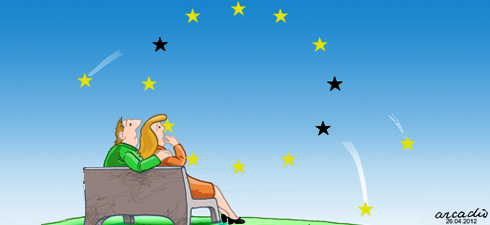Today we celebrate Europe Day. Well, celebrate... Europhiles of the more romantic persuasion are hanging the blue flag with yellow stars from their balcony, but that is pretty much as far as it goes in terms of show. The only fireworks to be seen are those in the financial markets. Or in Greek conference halls, where they are facing the nigh-on impossible task of putting together a coalition.
On 9 May 1950 the French foreign minister, Robert Schuman, called for a reconciliation between France and Germany. European integration was born, Brussels named a square after Schuman and 9 May officially became Europe Day.
Whenever Europe is discussed these days, however, it is only in terms of crisis and misery. Last weekend's elections in France and Greece have only reinforced the negative sentiment. One observer suspects that after Merkozy we are unlikely to see Mer-lande, but rather Mer-de. Greece? Well, better to let it sink into the Mediterranean.
Not all gloom and doom
For more than two years now we have been barraged with an uninterrupted flow of doom and gloom. Nevertheless, the euro still exists today, a euro which is worth a good deal more than upon its launch. Even the Greeks are still in it. Hundreds of billions of euros have been scraped together for the emergency funds and the ECB has already pumped one trillion euros into the economy. Countries are keeping a closer eye on each other than ever. Never before were budget negotiations in Belgium and elsewhere governed so much by ‘what does Europe demand?' or ‘what will Europe not allow?'.
This does not mean to say that everything is in order. Far from it. Frightening parties are gaining influence with each election, youth unemployment is approaching 50 percent in some countries, people are committing suicide because they cannot live with austerity any more – Europe most certainly does have a big problem.
A look at the European approach to the euro crisis does not provide any relief. The measures taken have always been just a little too late, just a little too vague or too limited. Grist for the mill of the critics, who mourn the lack of real leaders. Some believe that the failure to grasp the nettle has done more harm than good. Only radical solutions can help prevent the Union from – well, from what really? An implosion? There are increasingly loud calls to start again with a clean slate. To begin with, Greece must be thrown out of the euro. It is rather easy to come up with solutions from behind a desk.
The twenty-seven-headed Siamese twin
After sixty-two years we have melded together into something that is difficult to break apart. We have become a twenty-seven-headed Siamese twin, in which vital functions work together. European politicians consequently do not have a tendency to take backward steps. The price for spinning around on one's heels is generally high, or accompanied by uncertainty. It is this that distinguishes the coaches in the stands from the politicians with a sense of duty.
The latter fear inane adventures, like a complete break-up of the euro. It may well be possible to divide the euro zone proper without causing any waves, with five minutes of political courage. It is also possible that the whole world will feel the tremors. We simply do not know, as economists contradict each other.
This makes European politics stodgy and sticky: as soon as a decision has been made, it sticks. Further decisions are built on the foundations of earlier agreements. The page can never become blank again.
Starting again with a clean slate is not possible, but adjustment is. Adjustment is not just possible, it is essential. The past few months make it clear that a change of course is necessary. The rate at which political leaders are being voted out is unprecedented. Austerity does not win elections, but it is becoming clear that austerity alone will not save the economy.
The Union must offer the population, the Greeks first and foremost, some perspective. This sets the agenda for another summit, in two weeks.
Do you like our work?
Help multilingual European journalism to thrive, without ads or paywalls. Your one-off or regular support will keep our newsroom independent. Thank you!
















